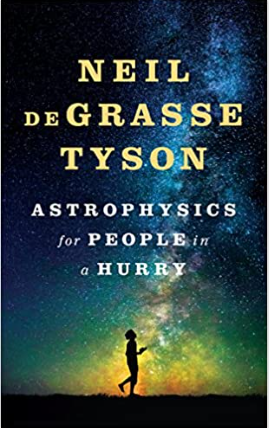"What is the nature of space and time? How do we fit within the universe? How does the universe fit within us? There's no better guide through these mind-expanding questions than acclaimed astrophysicist and best-selling author Neil deGrasse Tyson.
But today, few of us have time to contemplate the cosmos. So Tyson brings the universe down to Earth succinctly and clearly, with sparkling wit, in tasty chapters consumable anytime and anywhere in your busy day.
While you wait for your morning coffee to brew, for the bus, the train, or a plane to arrive, Astrophysics for People in a Hurry will reveal just what you need to be fluent and ready for the next cosmic headlines: from the Big Bang to black holes, from quarks to quantum mechanics, and from the search for planets to the search for life in the universe." Amazon
Why We are Reading This Book
Julie recommended the book because of her desire to better understand this subject. As someone, like many of us, has struggled with many of these ideas. The hope is that reading and discussing this book will help us better understand some of these foundational ideas of science.
Neil DeGrasse Tyson
The following section is taken from the Biography website.
Who Is Neil deGrasse Tyson?
One of America's best-known scientists, astrophysicist Neil deGrasse Tyson has spent much of his career sharing his knowledge with others. He has a great talent for presenting complex concepts in a clear and accessible manner.
After studying at Harvard University, he earned his doctorate from Columbia University in 1991. Tyson went to work for the Hayden Planetarium in 1996 before becoming its director. Additionally, he has served as host of NOVA ScienceNow and the StarTalk Radio podcast. Tyson remains a popular TV science expert today.
Early Life and Education
Born in New York City on October 5, 1958, Tyson discovered his love for the stars at an early age. When he was nine, he took a trip to the Hayden Planetarium at the Museum of Natural History where he got his first taste of star-gazing. Tyson later took classes at the Planetarium and got his own telescope. As a teenager, he would watch the skies from the roof of his apartment building.
An excellent student, Tyson graduated from the Bronx High School of Science in 1976. He then earned a bachelor's degree in Physics from Harvard University and a doctorate in astrophysics from Columbia University in 1991. After spending a few years doing post-doctorate work at Princeton University, Tyson landed a job at the Hayden Planetarium.
Director of the Hayden Planetarium
Tyson eventually became the director of the Hayden Planetarium and worked on an extensive renovation of the facility, assisting with its design and helping raise the necessary funds. The $210 million project was completed in 2000, and the revamped site offered visitors a cutting-edge look at astronomy. One of Tyson's most controversial decisions at the time was the removal of Pluto from the display of planets. He classified Pluto as a dwarf planet, which invoked a strong response from some visitors. While some asked for the planet Pluto back, the International Astronomical Union followed Tyson's lead in 2006. The organization officially labeled Pluto as a dwarf planet.
Continue reading more about him at the Biography website.
Video
This is an excellent two part interview with Tyson focused on the scientific aspects of the book. For those who do not have time to read or listen to the entire book this is a good summary of the book.
Part One
Part Two
Discussion
As I listened to the book I generally had three categories of questions come to mind. The first was surrounding the subject of physics and science in general. The second were technical questions surrounding the specific area of astrophysics he covered. And, lastly was a completely different set of questions spurred on by his last chapter "The Cosmic Perspective".
Why Physics Questions
- What is study of physics?
- How is astrophysics different than the study of regular physics?
- Since he devotes a chapter to chemistry, how are physics and chemistry related?
- What is science? Is astrophysics a science if it cannot strictly follow the scientific method?
Astrophysics Questions
- So Julie, how did this scratch your itch for physics?
- David, what did you learn about how great science "influencers" communicate?
Science and Morality Questions
- Cosmic perspective - Does the cosmic perspective lead to utopian peace or Nazi scientific Darwinism, Soviet scientism, or something else?
- Can "science" (rational thought) create a shared morality?
- When he practices ultracrepidarianism (a person who expresses opinions on matters outside the scope of their knowledge or expertise) in his final chapter, is he damaging the "institution" of science?
- The ultimate practitioner of the Cosmic Perspective....

What Next
Here are two possible options for us to explore for our next discussion, both of which recommended by David. With this said, we are open to other suggestions. These are two that are "in the news" so they popped up as options.
The Identity Trap by Yascha Mounk
For much of history, societies have violently oppressed ethnic, religious, and sexual minorities. It is no surprise that many who passionately believe in social justice came to believe that members of marginalized groups need to take pride in their identity to resist injustice.
But over the past decades, a healthy appreciation for the culture and heritage of minority groups has transformed into a counterproductive obsession with group identity in all its forms. A new ideology aiming to place each person’s matrix of identities at the center of social, cultural, and political life has quickly become highly influential. It stifles discourse, vilifies mutual influence as cultural appropriation, denies that members of different groups can truly understand one another, and insists that the way governments treat their citizens should depend on the color of their skin.
This, Yascha Mounk argues, is the identity trap. Though those who battle for these ideas are full of good intentions, they will ultimately make it harder to achieve progress toward the genuine equality we desperately need. Mounk has built his acclaimed scholarly career on being one of the first to warn of the risks right-wing populists pose to American democracy. But, he shows, those on the left and center who are stuck in the identity trap are now inadvertent allies to the MAGA movement.
In The Identity Trap, Mounk provides the most ambitious and comprehensive account to date of the origins, consequences, and limitations of so-called “wokeness.” He is the first to show how postmodernism, postcolonialism, and critical race theory forged the “identity synthesis” that conquered many college campuses by 2010. He lays out how a relatively marginal set of ideas came to gain tremendous influence in business, media, and government by 2020. He makes a nuanced philosophical case for why the application of these ideas to areas from education to public policy is proving to be so deeply counterproductive—and why universal, humanist values can best serve the vital goal of true equality. In explaining the huge political and cultural transformations of the past decade, The Identity Trap provides truth and clarity where they are needed most.
Homo Deus: A Brief History of Tomorrow by Yuval Noah Harari
Yuval Noah Harari, author of the critically acclaimed New York Times best seller and international phenomenon Sapiens, returns with an equally original, compelling, and provocative book, turning his focus toward humanity's future and our quest to upgrade humans into gods.
Over the past century, humankind has managed to do the impossible and rein in famine, plague, and war. This may seem hard to accept, but as Harari explains in his trademark style - thorough yet riveting - famine, plague, and war have been transformed from incomprehensible and uncontrollable forces of nature into manageable challenges. For the first time ever, more people die from eating too much than from eating too little; more people die from old age than from infectious diseases; and more people commit suicide than are killed by soldiers, terrorists, and criminals put together. The average American is 1,000 times more likely to die from binging at McDonalds than from being blown up by Al Qaeda.
What then will replace famine, plague, and war at the top of the human agenda? As the self-made gods of planet Earth, what destinies will we set ourselves, and which quests will we undertake? Homo Deus explores the projects, dreams, and nightmares that will shape the 21st century - from overcoming death to creating artificial life. It asks the fundamental questions: Where do we go from here? And how will we protect this fragile world from our own destructive powers? This is the next stage of evolution. This is Homo Deus.
With the same insight and clarity that made Sapiens an international hit and a New York Times best seller, Harari maps out our future.

